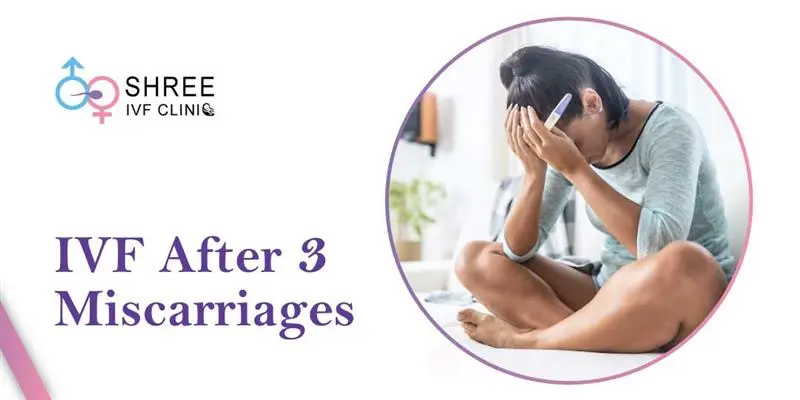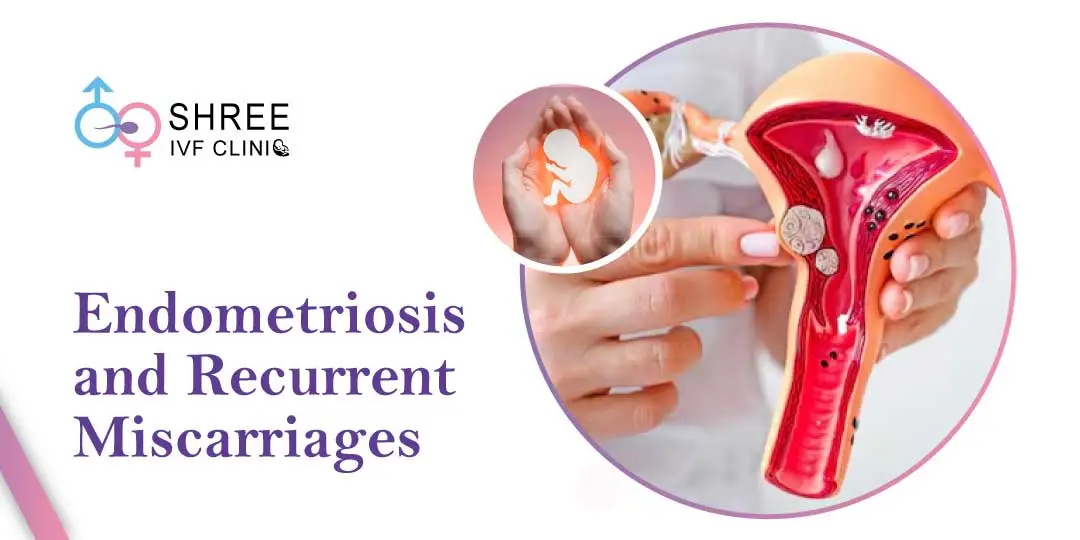Recurrent Pregnancy Loss Treatment at Shree IVF Clinic, Mumbai

Recurrent pregnancy loss (RPL), also commonly known as recurrent abortion or habitual abortion, happens when a woman has two or more miscarriages (clinical pregnancy losses) before the 20th week of gestation.
While the exact cause of RPL varies, it can include genetic factors, hormonal imbalances, uterine abnormalities, and immune system disorders. The emotional impact of RPL on individuals and couples is profound, often leading to feelings of grief, anxiety, and frustration.
The repetitive nature of the losses can challenge one’s mental health and emotional resilience, making support and understanding crucial parts of the treatment process.
Approximately 50% of the couples who are trying for a conception may experience a single abortion during their entire reproductive journey. Approximately 20% of them may experience two abortions during their entire reproductive journey, and around 12% of the couples may experience three abortions during their entire reproductive journey.
As a result of this predominant evaluation, the couples would begin after they had three spontaneous abortions.
Now it is important to understand here that in a practical life situation, considering the super anxiety of the patient and for a social circuit like India, we begin the evaluation typically after the second abortion has occurred.
Causes of Recurrent Pregnancy Loss
Recurrent abortions/recurrent pregnancy loss (RPL) can stem from various factors, each contributing to the complexity of diagnosing and treating this condition. Below are common causes of RPL with brief explanations:
- Chromosomal Abnormalities: Around half of all miscarriages are attributed to genetic issues, where an embryo receives an incorrect number of chromosomes during conception. This can hinder proper development. As a result of this, if the couple is experiencing recurrent pregnancy losses, evaluating the basic karyotyping of the couple and also taking a history for any consanguinity in the marriage becomes important.
- Hormonal Imbalances: Hormones such as progesterone, which are crucial for maintaining a pregnancy, can sometimes be imbalanced, leading to pregnancy loss. The most common treatable problems for hormonal deficiency, especially in a country like India, are hypothyroidism and hyperprolactinemia. Along with this, in a country like India, we also give a lot of importance to testing for the luteal phase defect. This is something that is typically present due to abnormal formation of the corpus luteum and can be one of the important preventable causes for recurrent pregnancy losses.
- Anatomical Problems: Structural abnormalities of the uterus, such as congenital malformations or the presence of scar tissue (Asherman syndrome), can interfere with embryo implantation or lead to complications during pregnancy. The common correctable defect that is present in this situation is a uterine septum, contrary to what people commonly think, believe, and try to market. There is no medical management which is available for any of the unethical problems that are present in the uterus; all of them require surgical correction only, and it is ideal that you go to a specialist to get it corrected so that you can have a long-term benefit.
- Uterine Fibroids: These non-cancerous growths in the uterine walls can distort the uterine cavity, potentially affecting implantation and pregnancy sustainability. Out of all the types of fibroids that are present, it is the submucous fibroid, or the fibroid that is present inside the endometrial cavity, that causes the maximum amount of pregnancy losses.
As a result of this, irrespective of the size of the fibroid, as long as it is impinging on the endometrium, or touching the endometrium, or coming into the cavity in all situations, the patient requires a surgical removal of the same. A lot of patients these days consider themselves to be extremely enlightened about this situation of fibroids, and as a result of this, they end up self-treating them with medications that simply don’t work and end up having multiple pregnancy losses.
- Clotting Disorders: Certain blood clotting disorders, like antiphospholipid syndrome, increase the risk of miscarriage by affecting blood flow to the placenta. APLA, anti-cardio antibodies, anti-beta 2 glycoprotein antibodies, elevated levels of other thrombotic factors, or deficiency of protein C and protein S are completely detectable and correctable causes of clotting, which, when treated correctly, can greatly reduce the number of abortions. A patient can experience.
- Immune System Issues: Sometimes, the mother’s immune system may mistakenly identify the pregnancy as a foreign threat, leading to an attack on fetal tissues.
- Unexplained Factors: Despite thorough investigations, in some instances, no specific cause can be identified, highlighting the need for further research in this area.
Understanding the underlying causes of RPL is the first step toward developing a tailored treatment approach that addresses these complex issues.
As a consultant and reproductive immunologist, Dr. Jay Mehta specializes in these types of cases where there could be a suspicion of the immune system being at fault. We have discussed that in great detail on our immunology page.
How We Diagnose Recurrent Pregnancy Loss at Shree IVF Clinic?
At Shree IVF & Endometriosis Clinic, diagnosing Recurrent Pregnancy Loss (RPL) involves a comprehensive and compassionate approach tailored to each individual’s unique situation. Our goal is to understand the underlying causes of RPL and work collaboratively with our patients throughout the diagnostic process.
Detailed Medical History:
The diagnostic journey begins with an in-depth discussion about the patient’s medical history. This includes not only their reproductive history but also any known genetic conditions, previous pregnancies, lifestyle factors, and any medications they may be taking. Understanding the patient’s overall health and any possible underlying conditions is crucial for a comprehensive diagnosis.
Physical Examination
A thorough physical examination is conducted to identify any physical signs that could contribute to RPL, such as anatomical abnormalities in the reproductive system. This examination helps in ruling out or identifying potential physical causes of recurrent miscarriages.
Blood Tests
Blood tests play a significant role in our diagnostic process. They are used to assess hormone levels, screen for infections, and identify any clotting disorders or immune system issues that could affect pregnancy. By evaluating these factors, we can gain insights into conditions that may be contributing to RPL.
Imaging Tests
Depending on the initial findings, we may also recommend imaging tests such as an ultrasound, MRI, or hysteroscopy. These tests help us visualize the uterus and identify any structural abnormalities, fibroids, or other issues that could interfere with a healthy pregnancy.
We give a lot of importance to the performance of something called a 3-D pelvic ultrasound, where we also try to add Doppler and look at the fine points and markers, which may help us diagnose the pelvic pathology in a much more detailed manner so that the patient can get immediate conclusive evidence of what could be actually happening inside the immune system.
Our approach at Shree IVF Clinic is deeply personalized. We understand that every patient’s story is unique, and we are committed to working closely with our patients to explore all possible avenues for diagnosis.
By combining a compassionate understanding of our patients’ experiences with state-of-the-art diagnostic techniques, we strive to uncover the root causes of RPL and develop a tailored treatment plan that addresses the specific needs of each individual we serve.
We offer comprehensive evaluation and personalized treatment plans to help you achieve a successful pregnancy.
Treatment Options for Recurrent Pregnancy Loss
At Shree IVF Clinic, our dedicated team specializes in offering comprehensive and bespoke treatment plans for recurrent abortions, tailored to each patient’s unique circumstances.
Our expertise in managing RPL is underpinned by a deep commitment to applying the latest advancements in medical science, to not only treat but also to enhance the chances of a successful pregnancy.
Below are some of the treatment options we offer, based on the causes identified through our detailed diagnostic process:
Medication:
For patients diagnosed with hormonal imbalances or specific autoimmune issues, medication can play a crucial role in managing RPL. Hormonal therapy, such as progesterone supplements, can be instrumental in supporting the early stages of pregnancy.
Additionally, treatments targeting immune system disorders may also be recommended to improve pregnancy outcomes.
Minimally Invasive Surgical Procedures:
Our clinic is equipped with state-of-the-art technology that allows us to perform minimally invasive surgeries to correct anatomical issues identified during the diagnostic phase.
For instance, a uterine septum, a common congenital malformation, can often be corrected through hysteroscopic surgery. These procedures are aimed at restoring normal uterine structure, thereby reducing the risk of future miscarriages.
Preimplantation Genetic Testing (PGT) for IVF Cycles:
For couples undergoing in vitro fertilisation (IVF), PGT offers a powerful tool to increase the likelihood of a healthy pregnancy. This genetic screening is performed on embryos before transfer, allowing us to select embryos without genetic abnormalities. PGT can be particularly beneficial for patients with a history of genetic disorders or those who have experienced unexplained RPL.
At our clinic, we believe that understanding the unique needs of each patient is key to successfully managing RPL.
Our interdisciplinary team works tirelessly to ensure that our treatments not only address the physical aspects of RPL but also provide the emotional support and guidance our patients need during this challenging time. With our comprehensive approach, we are committed to helping our patients achieve their dreams of parenthood.

5,140+
Google Reviews
397K+
subscribers
The Shree IVF Difference
At Shree IVF Clinic, we distinguish ourselves with a holistic and patient-centered approach that sets a new standard for the treatment of recurrent abortions in India.
Our clinic prides itself on the experienced and compassionate team of specialists who bring not only their expertise but also empathy to each case.
With advanced diagnostic facilities at our disposal, we are able to identify underlying causes of RPL with greater precision, ensuring that treatment can be as targeted and effective as possible.
Personalized treatment plans are at the heart of our philosophy. Recognizing that every patient’s journey is unique, we tailor our interventions to meet the specific needs and circumstances of each individual. This bespoke approach is complemented by our high success rates, reflecting our commitment to excellence and the effectiveness of our treatment modalities.
Beyond the technical and medical aspects of care, Shree IVF Clinic provides a supportive environment for patients. Our team is dedicated to offering support and understanding, creating a nurturing space where patients feel heard, valued, and hopeful.
This combination of cutting-edge medical care, personalized treatments, and compassionate support defines the Shree IVF difference, making us a beacon of hope for those navigating the challenges of RPL.
If you’re facing the challenges of recurrent pregnancy loss, do not lose hope.
Repeated abortions can be overwhelming, but we’re here to help. At Dr. Jay Mehta’s Reproductive Immunology Center, we provide expert treatment to address immune-related pregnancy issues. Our advanced solutions, including LIT therapy and customized care, can help you move forward on your path to parenthood.
We invite you to schedule a personal consultation with one of the best fertility specialists in Mumbai, Dr Jay Mehta to explore personalized guidance and treatment options tailored just for you. Join the multitude of families who have found success and solace in our care.
Contact us today at 1800-268-4000 to take the first step toward your journey of hope and healing. Your future family is waiting.

Dr. Jay Mehta
MBBS, DNB—Obstetrics & Gynecology
IVF & Endometriosis Specialist, Laparoscopic Surgeon (Obs & Gyn)
Dr. Jay Mehta is a renowned IVF specialist and fertility-preserving surgeon in Mumbai, India. He is the director of Shree IVF and Endometriosis Clinic, Mumbai. He is a leading laparoscopic gynecologist in India for endometriosis and adenomyosis.
He is a well-known fertility and IVF specialist and also among the few doctors in the country who specialize in embryology and andrology. He operates India’s major cities, including Mumbai, Pune, Chennai, Hyderabad, Bangalore, Ahmedabad, Agra, Delhi etc.
To book an appointment, call: 1800-268-4000 or fill out our contact form
Many Treatments. One Goal.
Caring for Every Patient, Every Day.
ALPA AINCHWAR
Thank you to the best endometriosis surgeon in our India.
Honest and very ethical person.
I want to add one thing, very respectful behavior towards all the patients here.
The only thing is doctor jay is very straight forward.
If he is getting so much work being so straight forward. I can only imagine what will happen if he becomes little sweet and sugary sugary to everyone. But whatever I know him he won’t become like that, kyunki iss Bande ko bhagwaan ka kuch alag aashirvaad hai
Vidhi Mehta
Dr Jay Mehta is a genius at treating endometriosis patients. To the point, no bakwaas. For 13 years I was made to believe I could never conceive naturally, from the age of 19 when I went to a hospital for the first time as an emergency endo patient.
After 2 endo surgeries, 1 failed IVF and a miscarriage here I meet the first doctor who said you will conceive naturally. (Hope). , This was God’s plan, Lord Shiva!!
Thank you Dr. Jay, Dr. Vismay, and the entire team for the hope, treatment, hospitality, and the quickest discharge.
RENUKA RAUT
Great Experience. I have been operated for grade 4 endometriosis. I have never seen a doctor like Jay Sir in my entire life..he is very concerned about his patients..going out of the way to make things possible
Finally, I found an endometriosis specialist after struggling a lot. I am In a safe hand. Each and every staff of this hospital is well-trained and well-managed..highly recommended
Sunitha Suni
He is the god me because im suffering from since 4year pain full period of endometriosis problem im going to so many hospitals any one not identify the problem he is identify and clear endometriosis problem, thanq Dr jay metha sir, Dr Chaitali Rao and ur team Good receiving thanq so much sir ur save my life
md Sohail
Dr. Jay Mehta, what a doctor he is ..hats off.
I really wanted to thank from the bottom of my heart to Dr. Jay Mehta and his dedicated and caring team.
We came from Hyderabad and undergone a major surgery. What a guts he has. I highly recommend Dr Jay Mehta for women who needs a cure for Endometriosis.
Huge thanks to Dr. Chaitali, Dr. Vismai sir and all the supporting staff, nurses and mausis. He is the great doctor and do the best treatment.
Overall very rare kind of personality is Dr.Jay Mehta among the present generation of doctors.
Ankit Jain
I wanted to thank Dr. Jay and his dedicated and caring team at Shree IVF & Endometriosis Hospital at Ghatkopar, Mumbai for the Endometriosis surgery performed. His knowledge of this dreadful disease and its treatment to help thousands of endometriotic women is truly amazing.
He is a gem of a person, explains the problem to patients and their families nicely, and proposes surgical treatment. His caring team also makes the stay in the hospital post-op help to recover quickly.
I highly recommend Dr Jay Mehta for women who need a cure for Endometriosis. He also works brilliantly for IVF and other gynac issues. Kindly check with the clinic and hospital and plan your visit accordingly. They also help with nearby stays for outstation patients. God bless you and give you the strength to continue to work in the noble field.
Blogs

Should I Do IVF After 3 Miscarriages?
Yes, IVF can be a strong option after repeated miscarriages. Combined with genetic testing, it helps increase the chance of a healthy pregnancy

Link Between Endometriosis and Recurrent Miscarriage
Studies show women with endometriosis have a higher chance of repeated pregnancy loss compared to those without the condition
Videos

Best Sex Position to Get Pregnant Naturally
Best positions to get pregnant—try missionary or using pillows under your hips. Small changes can boost your chances of conceiving

Importance of the Fallopian Tubes in Fertility
Blocked fallopian tubes can prevent natural pregnancy. Understand their role and explore solutions for boosting your fertility

